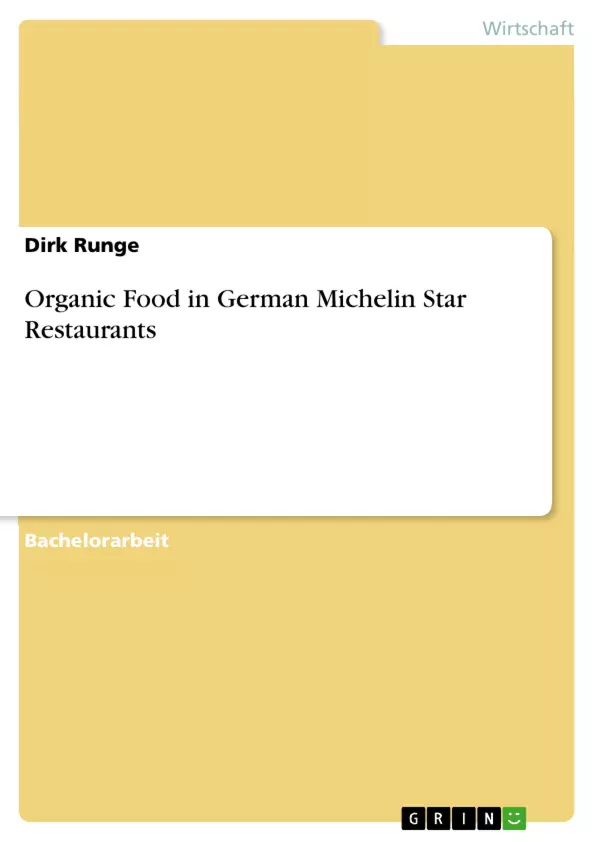The aim of this work is to investigate why German Michelin Star restaurants offer organic food. The purpose was to examine the motivation and reasons of German Michelin Star restaurants for offering organic food to their customers.
This work is divided into five main parts of study, namely literature review, methodology, results, discussion and conclusion.
Both primary and secondary researches were undertaken for the study. The secondary research focused on both organic food and Michelin Star restaurants.
The Guide Michelin is a well known ranking system focusing on quality gastronomy; hence it becomes obvious that restaurants mainly focus on high quality and customers’ choice.
The German market is nowadays the most important market for organic products in the world. Further, it is quite hard to define organic food as standards differ worldwide.
The primary research consisted on carrying out an email questionnaire to 225 German Michelin Star restaurants, which has been limited by having conducted the questionnaire during the busiest time period resulting that only one Star Michelin restaurants responded; hence the aim of this study can not be answered completely.
Considering the customers view, it is noticeable that the majority of consumers demanding organic food are younger, educated, sophisticated customers, who are willing to pay premium prices for high quality products.
The results found out, that Michelin Star restaurants are focused on both improving their product quality and on achieving a high level of customer satisfaction. This indicates a main reason why German Michelin Star restaurants offer organic food with their aim to improve the quality of their products and flavour.
Inhaltsverzeichnis
- 1. INTRODUCTION
- Background to the study
- Aim and objectives
- 2. LITERATURE REVIEW
- Michelin Star restaurants
- The Guide Michelin
- Rating of Michelin Stars
- Growth and development of the German Michelin Star restaurant market
- Demand and demographic structures
- Organic Food
- Definition of organic food
- Organic food in Germany and its growth and development
- Certification process and local food
- Consumer behaviour and organic food
- Mainly used organic products in German hospitality
- Conclusion
- Michelin Star restaurants
- 3. METHODOLOGY
- Introduction
- Research Process
- Secondary Research
- Secondary Research Limitations
- Research Ethics
- Primary Research
- Data collection
- Sample
- Interpreting and Analysing the Data
- Primary Research Limitations
- 4. RESULTS
- 5. DISCUSSION
- Is organic certification important?
- How important is it for restaurants to use organic products?
- Is quality defined differently?
- How much do the customer and the culture in Germany influence the offer of Michelin Star restaurants?
- 6. CONCLUSION
- 7. RECOMMENDATIONS
- Recommendations for further studies
- Recommendations for the industry
Zielsetzung und Themenschwerpunkte
Diese Arbeit befasst sich mit der Frage, warum deutsche Michelin-Sterne-Restaurants Bio-Lebensmittel anbieten. Ziel ist es, die Motivation und die Gründe für die Verwendung von Bio-Produkten in diesen Restaurants zu untersuchen.
- Bedeutung von Bio-Zertifizierung für Michelin-Sterne-Restaurants
- Einfluss von Bio-Produkten auf die Qualität und den Geschmack der Speisen
- Konsumentenverhalten und die Nachfrage nach Bio-Lebensmitteln
- Kulturelle und wirtschaftliche Faktoren im deutschen Markt für Bio-Produkte
- Die Rolle der Nachhaltigkeit und der Umweltverträglichkeit in der gehobenen Gastronomie
Zusammenfassung der Kapitel
- Kapitel 1: Introduction: Dieses Kapitel führt in das Thema ein und erläutert den Hintergrund der Studie sowie die Ziele und den Umfang der Arbeit.
- Kapitel 2: Literature Review: Dieses Kapitel bietet einen Überblick über die relevante Literatur zu Michelin-Sterne-Restaurants und Bio-Lebensmitteln. Es beleuchtet die Geschichte, die Entwicklung und die Bedeutung beider Bereiche.
- Kapitel 3: Methodology: Dieses Kapitel beschreibt die Forschungsmethodik, die in dieser Arbeit verwendet wurde. Es beinhaltet die Erläuterung der Primär- und Sekundärforschung sowie der Datenerhebung und -analyse.
- Kapitel 4: Results: Dieses Kapitel präsentiert die Ergebnisse der durchgeführten Forschung.
- Kapitel 5: Discussion: Dieses Kapitel analysiert und interpretiert die Ergebnisse der Studie. Es untersucht die Bedeutung der Ergebnisse im Kontext der Forschungsfragen und diskutiert die Implikationen für die Praxis.
- Kapitel 6: Conclusion: Dieses Kapitel fasst die wichtigsten Ergebnisse der Arbeit zusammen und zieht Schlussfolgerungen.
- Kapitel 7: Recommendations: Dieses Kapitel bietet Empfehlungen für weitere Forschung und für die Praxis in der Gastronomie.
Schlüsselwörter
Die Arbeit konzentriert sich auf die Themen Bio-Lebensmittel, Michelin-Sterne-Restaurants, Gastronomie, Konsumentenverhalten, Nachhaltigkeit, Qualität, Geschmack, Zertifizierung, deutscher Markt, Premium-Produkte, Forschung, Kundenorientierung.
Häufig gestellte Fragen
Warum bieten deutsche Michelin-Sterne-Restaurants Bio-Lebensmittel an?
Die Hauptgründe sind die Verbesserung der Produktqualität und des Geschmacks sowie das Ziel, eine hohe Kundenzufriedenheit bei einer anspruchsvollen Zielgruppe zu erreichen.
Wer ist die typische Zielgruppe für Bio-Produkte in der Luxusgastronomie?
Die Nachfrage kommt vor allem von jüngeren, gebildeten und anspruchsvollen Kunden, die bereit sind, Premium-Preise für nachhaltige und qualitativ hochwertige Produkte zu zahlen.
Wie wichtig ist die Bio-Zertifizierung für Sterne-Restaurants?
Obwohl Qualität an erster Stelle steht, gewinnt die Zertifizierung an Bedeutung, um Transparenz zu schaffen und den hohen Erwartungen der Gäste an Nachhaltigkeit gerecht zu werden.
Wie wird "Qualität" in der gehobenen Gastronomie definiert?
Qualität definiert sich über den unverfälschten Geschmack, die Herkunft der Zutaten und die handwerkliche Perfektion, wobei Bio-Produkte oft als überlegen angesehen werden.
Welche Rolle spielt der Guide Michelin für den Markt?
Der Guide Michelin setzt weltweit Standards für exzellente Gastronomie. Restaurants in diesem Segment orientieren sich stark an den Präferenzen ihrer Gäste, zu denen zunehmend ökologische Aspekte gehören.
- Quote paper
- Dirk Runge (Author), 2010, Organic Food in German Michelin Star Restaurants, Munich, GRIN Verlag, https://www.grin.com/document/152741



